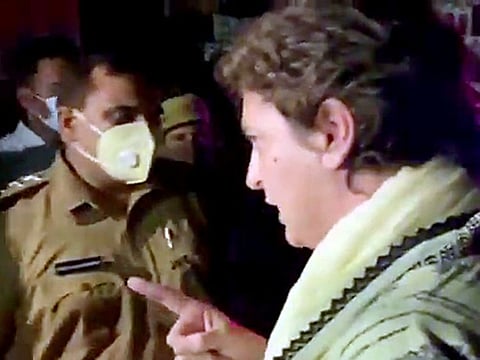India: Priyanka Gandhi’s detention undermines the rule of law
Illegally detaining opposition leaders in a democracy is undemocratic and unconstitutional

“The BJP thinks it is going to Indianise Kashmir. But, instead, what we will see is potentially the Kashmirisation of India”. Those were the prescient words of scholar Pratap Bhanu Mehta written the day after the dilution of Article 370 in 2019.
Opposition leaders were placed under arrest then, and today in India’s largest state, Uttar Pradesh, similar scenes have played out this week. From house arrest to actual arrest to not allowing a sitting Chief Minister of another state to enter Lucknow, this is a spectacular undermining of the law.
In a statement issued on the evening of the Oct. 5, Congress General Secretary Priyanka Gandhi Vadra said she had been placed under arrest “verbally” by DSP Piyush Singh of Sitapur, at 4:30am on October 4.
Priyanka was on her way to the neighbouring district of Lakhimpur Kheri, where the son of the country’s junior home minister has been accused of running over a group of protesting farmers with his SUV, a charge he denies.
An illegal detention
By the time Priyanka put out her statement, she had already been in detention for 38 hours without any formal communication or any kind of paperwork shown to her by the police to explain what the charges were.
Police slapped an First Information Report (FIR) against her shortly after she went public with her charges of not being shown any papers but even that FIR wasn’t shown to her. She and Congress leader Deepinder Hooda, who was also arrested, had also not been produced before a magistrate, as per the law.
Former Supreme Court justice Madan Lokur has called the detention illegal. Not too far away, former UP Chief Minister Akhilesh Yadav was placed under house arrest so that he too could not go to Lakhimpur Kheri.
As leading legal experts have pointed out, there can be no kind of arrest, house arrest or otherwise, without being produced before a magistrate. Everything else, they say, is illegal detention.
At Lucknow airport, there were dramatic scenes as Chhattisgarh chief minister Bhupesh Bhagel sat on the floor of the airport when the police said they could not allow him to go into Lucknow city. Rahul Gandhi was finally given permission to go to the site of the murders on Wednesday.
Consequences for all
Some people say it doesn’t matter what happens to politicians, that this is a part of politics. But it is not OK and has consequences for all of us. We cannot normalise the criminalisation of dissent in this country and arresting and illegally detaining opposition leaders in a democracy is, very simply, undemocratic.
Indira Gandhi did it during the Emergency, and she was wrong. It is wrong now too. This is what tinpot autocracies do, not the ‘mother of democracy’ that the prime minister was speaking of at the United Nations General Assembly only last week.
It should worry us when institutions behave this way, where rule of law is casually thrown aside. In the name of law and order and national security, anything goes.
Every excess is sought to be justified. It seems the BJP has forgotten that while the 26/11 Mumbai terror attacks were going on, the then chief minister of Gujarat, Narendra Modi, flew to the city, visited the sites of the attacks and even addressed the media outside the Oberoi-Trident hotel which was one of the targets.
In the present situation, the Supreme Court should have stepped in, suo moto, and demand to know under what laws politicians are being detained. But instead the court told the farmers they can’t protest while the matter is before the courts, not explaining what the contradiction is. But that’s another story.
(Update: Supreme Court has finally taken cognisance of farmers’ killing. A three-judge bench comprising CJI Ramana and justices Surya Kant and Hima Kohli would hear the matter on Thursday)
Sign up for the Daily Briefing
Get the latest news and updates straight to your inbox







